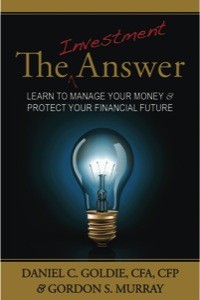
The American public has a huge lack of knowledge about investments. The reasons for this are numerous. The education system doesn’t teach kids about personal finance. People generally aren’t interested in investing. Plus the rules of the game are purposely made complicated to act as a barrier to learning. The less the public knows about investments, the more money can be made off of them.
This lack of knowledge is beyond unfortunate. Pensions are rarely offered by employers any longer, the Social Security age increased from 65 to 67 and Medicare changes are on the horizon. In this time of our history, it is more important than ever for every individual to have a basic understanding of investments in order to retire comfortably.
One way to increase your knowledge of investments is to read about it. There are thousands of books on the subject so it is even difficult to decide which one to read. That’s why I’d like to tell you about one book that is a great place to start.
It’s called The Investment Answer by Gordon Murray and Dan Goldie. Murray was a Wall Street veteran diagnosed with a brain tumor and six months to live. He called his good friend and financial adviser Goldie to say it was time they write a book explaining how regular folks should invest.
Their goal was to write an investment book that someone could read and understand in one sitting. In 75 brief pages, they provide the most important investment concepts you should know without using jargon or getting too technical. So it’s perfect for beginners and especially good for people that already work with a financial adviser.
This book is organized into five decisions everyone has to make regarding their investments. As the authors point out, we all make these five decisions even if we do nothing. So you might as well learn about investments in order to make these decisions based on knowledge rather than ignorance.
The five decisions are:
Should you try to invest on your own or seek help? If so, what type of adviser is best? Their answer is to hire an independent, fee-only financial adviser.
How should you allocate your investments among stocks, bonds and cash? Their answer is that your risk tolerance and age should determine what percentage of your portfolio to invest in stocks and bonds. The book provides plenty of guidance on this decision.
Which specific asset classes within the broader stock and bond categories should you have in your portfolio, and in what proportions? Their answer is to diversify your money among all the major asset classes: cash, short-term bonds, intermediate-term bonds, large cap stocks, small cap stocks and international stocks.
Should you choose an active management philosophy to try to outsmart the market or a passive investment approach that delivers market returns? Their answer is to choose a passive investment strategy.
How often should you rebalance your portfolio? Their answer is to rebalance once per year.
The reasons for their answers are laid out in a logical, easy-to-read discussion backed by facts that will make you an informed investor. Your answers may be different than the authors, and that’s perfectly fine. The important take-aways from this book are to 1) know what are the big decisions you need to make and 2) make those decisions with good information.
The bottom line is that you need to set aside the time to learn about investments. Now more than ever, your happy retirement is linked to your investments. Don’t leave it to chance and that it’ll all work out. Become informed and make good decisions.
Steve Doster is a Certified Financial Planner™ professional providing commission-free financial advice for do-it-yourself investors. You can reach Steve at Doster Financial Planning by phone 619-688-1192 or email steve@dosterfinancialplanning.com. You can also follow Steve on Facebook, Linked In, Twitter, or blog to get more personal finance advice and tips.











